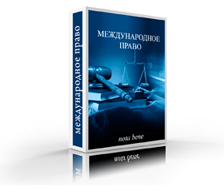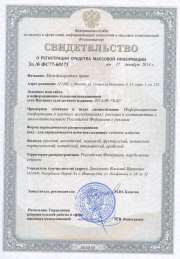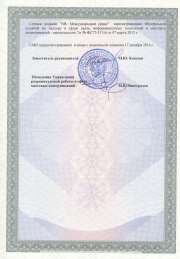|
MAIN PAGE
> Back to contents
Publications of Sazonova Kira L'vovna
|
Sazonova K.L. - Prospects for bringing countries to international responsibility for the spread of mass diseases (on the example of the PeopleТs Republic of China and COVID-19 pandemic)
|
|
pp. 55-70
|
DOI: 10.7256/2454-0706.2021.8.36097
Abstract: The COVID-19 pandemic, which commenced in 2020 and continues into 2021, called on the world re-evaluate many ordinary phenomena, including the impact on the international law, and namely international responsibility. The unprecedented scale of the problem, worldwide lockdown, as well as global deceleration of virtually all processes have led the experts, politicians and regular persons to seek the answer the question of whether anyone should be held responsible for what has happened. This article dwells on whether it is possible to bring the country to international responsibility for the spread of a mass disease relying on the theoretical and practical aspects of the branch of international responsibility. Unlike the foreign expert community with a dynamic discussion of implementation of responsibility for the pandemic, the Russian doctrine has not conducted similar analysis. Certain public political figures openly blamed China for the outbreak of COVID-19 pandemic, referring to the fact that it originated in the Chinese province Wuhan. The United States have initiated lawsuits against China and Chinese government over the pandemic. It is of utmost importance to analyze the legitimacy of such articulation of the question is, and what the evidence base should be in such cases. In this regard, the analysis of the theoretical prerequisites and feasibility for bringing the countries to international responsibility for the spread of mass diseases have a crucial scientific and practical significance.

|
Sazonova K.L. - Official recognition of facts as an institution of international law: problems and
|
|
pp. 222-238
|
DOI: 10.7256/2454-0706.2020.9.33898
Abstract: We are witnessing a formation of the new institution of recognition, which can be referred to as the “official recognition of facts”. Such seemingly different political themes as annexation of Crimea by the Russian Federation, the “Skripal Case”, or the status of the Golan Heights have an important common parameter – each of them has become an object of recognition by at least one country. Examination of the causal links that conduce certain countries to issuing the acts of recognition of long-past events or territorial changes are of considerable scientific and practical interest. Recognition of facts by the state is of paramount importance, as it[WU1] is documented and reflects stance on a specific event, fact, or occurrence. Recognition ensures legitimacy for further actions of the state and initiates a chain of related political and legal events, including sanctions. Over the recent years, recognition of facts by the countries has become more frequent, and virtually becomes a means of political manipulation. Classification of the facts and events that have most often been the subject of recognition allows determining the common trends in the procedure of recognition, as well as the factors that prompt the country to resort to such step. Thus, at times strange and illogical actions of the state associated with the official recognition or non-recognition of the fact acquire a specific political and legal meaning, and allow analyzing the new strategic vectors in intergovernmental relations.

|
Sazonova K.L. - Official recognition of facts as an institution of international law: problems and
|
|
pp. 222-238
|
DOI: 10.7256/2454-0706.2020.9.43374
Abstract: We are witnessing a formation of the new institution of recognition, which can be referred to as the “official recognition of facts”. Such seemingly different political themes as annexation of Crimea by the Russian Federation, the “Skripal Case”, or the status of the Golan Heights have an important common parameter – each of them has become an object of recognition by at least one country. Examination of the causal links that conduce certain countries to issuing the acts of recognition of long-past events or territorial changes are of considerable scientific and practical interest. Recognition of facts by the state is of paramount importance, as it[WU1] is documented and reflects stance on a specific event, fact, or occurrence. Recognition ensures legitimacy for further actions of the state and initiates a chain of related political and legal events, including sanctions. Over the recent years, recognition of facts by the countries has become more frequent, and virtually becomes a means of political manipulation. Classification of the facts and events that have most often been the subject of recognition allows determining the common trends in the procedure of recognition, as well as the factors that prompt the country to resort to such step. Thus, at times strange and illogical actions of the state associated with the official recognition or non-recognition of the fact acquire a specific political and legal meaning, and allow analyzing the new strategic vectors in intergovernmental relations.

|
International Law, 2020-4
|
|
Sazonova K.L. - Responsibility of the states for the colonial era as the core trend of the modern international law discourse
|
|
pp. 25-41
|
DOI: 10.25136/2644-5514.2020.4.33309
Abstract: This article examines the international legal responsibility of modern states, which at some point used to be metropoles (mother country) before their former colonies, as well as analyzes the question of whether the centuries-old events can serve as the foundation for implementation of modern forms of international liability of the states. The subject of this research is the historical responsibility of ex-metropoles before their former colonies. The object of this research is the modern forms of international law, within the framework of which this responsibility can be exercised. The author comprehensively reviews the content of current claims of the former colonies, namely on the payment of reparations, admission of guilt, and issuance of formal apology by ex-metropoles. The conclusion is made that current claims of the former colonies emerged within the framework of global trend of recent time, associated with the attempt to view the international relations of past eras through the prism of modern legal and political paradigm, which differs significantly. For example, the modern political-legal paradigm relies on giving absolute priority to human rights and human life, which was uncharacteristic to the previous historical periods. Therefore, the attempts of current reconsideration of historical events, laying down the reparation demands, can lead to significant deterioration of modern intergovernmental relations, rather than improvement thereof.

|
National Security, 2018-6
|
|
Sazonova K.L. - Current international legal status of the weapon of mass destruction (WMD) and international responsibility of the states for its use
|
|
pp. 52-65
|
DOI: 10.7256/2454-0668.2018.6.28480
Abstract: The topic of total and partial ban on certain types of weapons constantly remained highly relevant for international law. However, even the adoption of multiple international agreements is not conducive to eliminate incidences of the use of particular types of prohibited weapons. The possible use of weapons, classified as the “weapon of mass destruction”, cause special concern due to their high lethal power. Another pressing issue is the question of holding internationally responsible the countries for using such weapons. This research is based on the analysis of provisions of the international treaties and conventions regulating the use of various types of WMD; international legal documents regulating the questions of international responsibility of the states; as well as doctrinal studies of the Russian and foreign authors. Leaning on the conducted research alongside the analysis of particular cases of use of the weapon of mass destruction, the author determines the key problems related to holding countries internationally responsible. The conclusion is made that the international legal regulation of the status of weapon of mass destruction has multiple gaps, which impedes adequate raising of the question of possible international responsibility of states for usage of such type of weapons. The treaties and conventions regulating WMD are limited either by the pool of participants or the absence of control mechanisms. Moreover, it is especially difficult to identify the responsible party in use of WMD in terms of the domestic armed conflict. In this case, special importance falls development of mechanisms for collecting facts and counteracting information speculations.

|
National Security, 2016-2
|
|
Sazonova K.L. - The question of international legal responsibility of the North Atlantic Treaty Organization (NATO): theoretical conceptual aspects and key legal collisions based on the results of the realized operations
|
|
|
DOI: 10.7256/2454-0668.2016.2.15527
Abstract: This research is dedicated to the questions of setting the international legal responsibility for misuse of force, destruction of infrastructure, and victims among the civil population, which is the result of military operations realized by the North Atlantic Treaty Organization. The author analyzes the main legal difficulties that emerge due to the possibility of holding NATO internationally responsible. In addition to that, the author examines the questions of correlation between the peacemaking functions of NATO and UN with regards to the maintenance of international peace and security, which is especially relevant considering the active strive of the Alliance to take on the extensive competency in these field. The conclusion is made that the main operations conducted by NATO were accompanied by the major violations of the existing international law, which allows posing a question that such violations can qualify as the foundations for international responsibility. We can state that today the question of high importance consists in which judicial body could knowledgeably examine the case on setting the international legal responsibility of international organizations.

|
Sazonova K.L. - "How to Stop Worrying and Start Living": the Impact of anti-Russian Sanctions and Countermeasures on the Contemporary International Law
|
|
pp. 78-108
|
DOI: 10.7256/2409-7543.2015.3.15367
Abstract: The presented article is focused on the most debatable international law issues which have arisen from the introduction of a full "package" of sanctions of international organizations and certain states against the Russian Federation, and also in connection with the realization of anti-Russian countermeasures last year. Anti-Russian sanctions and counter-measures significantly enriched the case practice of international interaction in this sphere, having given a new impulse to doctrinal assessment of problems in this sphere.The author uses both comparative and legal methods, and also a method of interpretation of legal norms. The conclusions and cause-and-effect relations, as well as conceptual generalizations were made by means of the logical method.On the basis of the analysis of anti-Russian sanctions and countermeasures, the author offers some conceptual theses. First, the author notes that the term "sanctions" can be used, at least, in three various contexts. Secondly, it is possible to note that the present doctrine of international law doesn't have a clear understanding of the differences between sanctions and counter-measures, which leads to serious confusion. Thirdly, the questions connected with sanctions and countermeasures of last year considerably strengthened doctrinal differences between the Russian and western schools of international law, and also caused the most essential changes in the configuration of the contemporary system of international law since the end of the "cold war". Besides, the author notes significant terminological difficulties of the considered sphere, which also led to the emergence of new phenomena and terms, which may be subjected to a further doctrinal assessment.

|
National Security, 2015-1
|
|
Sazonova K.L. - The "state terrorism" policy: challenge to the existing system of universal collective security and the possible basis for international state accountability
|
|
|
DOI: 10.7256/2454-0668.2015.1.14147
Abstract: This article examines the debatable category of "state terrorism". The object of this research is the certain illegal activity perpetrated by a state, for example, the organization of revolutions, active financial and military support of the opposition, the illegal listening of foreign embassies, murders of politicians and other illegal actions that are carried out by intelligence services of one state on the territory of another. The subject of research is normative-legal regulation contained in the international legal documents on state accountability for such illegal activity. The main conclusion of this research is that the actions related to policy of “state terrorism” are extremely difficult to diagnose as basis for international accountability of a state. Nevertheless, taking into account the illegality and big social danger of the state terrorism, it is necessary to promote the development of the universal international standards for further determination of such activity as the basis for international accountability of the states.

DOI: 10.7256/2454-0706.2014.4.11357
Abstract:
DOI: 10.7256/2454-0706.2014.4.42425
Abstract:
|
International Law, 2014-1
|
|
Sazonova K.L. - International law and Ukrainian conflict: what was, what will be, and what the heart shall find its rest in.
|
|
pp. 1-15
|
DOI: 10.7256/2306-9899.2014.1.11666
Abstract: The Ukrainian crisis has been the subject of much discussion in the latest months. A large amount of information is provided, and the special attention is paid to the international legal aspects of the situation. At the same times, the references to the international law are being rather frivolous and they lack clear substantiation. Such references with rather relative understanding of the situation serve as grounds for speculations with international legal categories and terms. It seems necessary to clarify international stereotypes regarding international legal aspects of the Ukrainian events, which have formed in the latest months in the information zones both in Russia and abroad. The article uses materials and comments of both Russian and foreign international law scholars and politicians regarding the Ukrainian conflict within the framework of international law. The article may be divided into two relative parts. Firstly, the author generalizes the most popular techniques for the speculations with the term "international law" in the information sphere in the latest months. Then, the article provides legal evaluation of the six most popular international law theses regarding Ukraine and Crimea situation. Additionally, the author discusses the possible influence of the Ukrainian events on the further development of international law.

DOI: 10.7256/2454-0706.2013.9.9410
Abstract:
DOI: 10.7256/2454-0706.2013.9.42304
Abstract:
DOI: 10.7256/2454-0706.2013.6.6265
Abstract:
DOI: 10.7256/2454-0706.2013.6.42044
Abstract:
|
International Law, 2013-2
|
|
Sazonova K.L. - The Big Five and the peace-making activities of the United Nations Organization: political and legal threats and challenges.
|
|
pp. 1-15
|
DOI: 10.7256/2306-9899.2013.2.4769
Abstract: "The Big Five", "the Great Powers", "the permanent Five" - all of these terms refer to the Permanent Member of the Security Council of the United Nations Organizations. These states - the Russian Federation, the United States of America, the Great Britain, France and China - bear special responsibility for the protection of international peace and security, and they make decisions, which influence the entire universal collective security system. Throughout 68 years of existence of the UN the reaction of the international community to this institution has been ambiguous. The Permanent Members of the Security Council of the UN treasure their status greatly and protect it actively, and these states also bear the key political responsibility for the mistakes and failures of the organization as a whole. That is why, it is of interest to the author to study the role of the "Big Five" in the peace-making system of the UN. The author analyzes the actions of the "Big Five" states in the conditions of continually complicating goals, which the UN is facing, and she also discusses the perspectives for the future reform of the UN Security Council.

|
International Law and International Organizations, 2012-10
|
Abstract:
|
Sazonova K.L. - The institution of state responsibility of for the use of force: present stage and perspectives of development.
|
|
pp. 78-91
|
Abstract: The article describes the main international legal issues associated with the problem of state responsibility for the use of force as an institution of responsibility in the international law. The author focuses on the lack of unity between the theoretical and practical aspects of the use of force, as well as on the role the institution plays in progressive development of law. The article also highlights the current issues related to change of the paradigm of modern international law because of the trend of recent years like the use of force in circumvention of the UN Charter. The author proves the gradual formation of a "parallel" legal regimes, which are based on the rule of military force factors. The author focuses on the problem of conflicts in the Middle East, the problems associated with the current concept of the UN peacekeeping conception and its reformation.The author gives a number of recommendations for the development of the institute of state responsibility in international law.

|
International Law, 2012-1
|
|
Sazonova K.L. - International Responsibility of States: Problems And Perspectives
|
|
pp. 16-25
|
Abstract: This article examines one of the least regulated institutions of modern international law- the institute of the responsibility of international intergovernmental organizations. This institution is not codified properly, there is only a Draft articles on responsibility of international organizations 2006, which was launched in 1963 as a codification of customary law.An important aspect is the specific legal personality of organizations, which is derivative and special, which affects the issues of responsibility. The author focuses on the history of formation and codification guidelines and standards related to the international legal responsibility of the organizations. The article compares the characteristics and specificity of the responsibility of international organizations in comparison with states responsibility, and also the reasons for international responsibility of organizations.The author analyses the implementation of international responsibility in cases when there is a functional relationship between an international organization and its officials, as well as situations where the state is the co-perpetrator of the international crime with the international organization.

Abstract:
Abstract:
|
|






